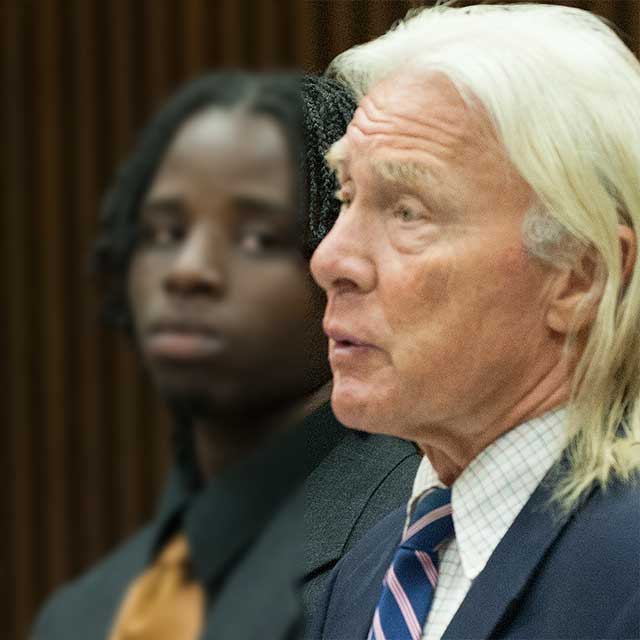Davontae Sanford's Road to Freedom
A lapse in the defense?
By George Hunter / The Detroit News

Davontae Sanford defense attorney Robert Slameka
The case against Davontae Sanford rested in large part on statements he made to police, but his attorney didn’t try to get the statements thrown out, even though legal experts say there were several valid arguments for doing so.
That was one of many oversights by Sanford’s lawyer, Robert Slameka, who also didn’t bother cross-examining the detective who’d interrogated Sanford.
The law license of Slameka, who did not respond to a request for an interview, was suspended last year after being convicted of breaking into his girlfriend’s home.
Prior to Sanford’s trial and ultimate guilty plea, the 14-year-old was insisting he had made up the story he told police the night of the Runyon murders about his involvement in the crime.
“They started showing me pictures of the bodies,” Sanford told psychologist Lynne Schwartz during a December 2007 competency exam. “Then they said to me that I did it.”
Sanford said police allowed him to go home, and that he got drunk the next day. Then, he said officers showed up again that night.
“They said we know you did it now and they took me down to the station,” he said. “I was like ‘take me back home.’ I was drunk and about to throw up. They said they were going to take me home when they were done. I kept saying I don’t know what happened. Then they said that my momma called and they were going to take me home. They said ‘just tell me something.’ I was like ‘all right’ and I started making up something.
“I was like answering questions like yes or no. Then I thought I was going home, but they took me to juvie.”
Despite Sanford’s insistence his statements had been false, his attorney didn’t seek to have them thrown out.
Sanford’s bench trial lasted less than two days on March 17 and 18, 2008. The prosecution’s witnesses included Sgt. Mike Russell, who had interrogated Sanford the night of the killings; Jesse King, who lived across the street from the crime scene and who exchanged gunfire with the killers as they ran from the house; and the prosecution’s final witness, Valerie Glover, the sole survivor of the shootings.

This is the bed in the back bedroom. A fifth victim, a female, was shot five times and ran from the front room into this bedroom. There was a child sleeping in this room. She hid under the bed.
Glover testified that one of the masked killers spoke with her while she hid beneath a bed, and that he “didn’t have no bass in his voice. He just sounded like a kid.” Sanford was ordered to speak on the record, and Glover said his voice “sound(ed) like” and was “consistent” with the killer’s voice, although she couldn’t say for sure whether Sanford’s voice matched the gunman’s.
On the trial’s second day, after a lunch break, Davontae, then 15, took Slameka’s advice and pleaded guilty to four counts of second-degree murder.
During the guilty plea, Judge Brian Sullivan asked Sanford why he’d committed the shootings. Sanford answered: “I guess just to rob them and take the money.”
Slameka’s handling of the Sanford case has been criticized, one of many cases that have come under question during his checkered career:
Slameka has had 17 reprimands and admonishments since 1986 from the Attorney Discipline Board for failing to provide adequate defense to his clients. Among the offenses: neglecting to file motions for appeal, failing to communicate with his clients, and taking money from defendants for services he never delivered.
Slameka was the attorney for Eddie Joe Lloyd, who in 2002 became the first Michigan convict exonerated on the basis of DNA evidence. Slameka handled Lloyd’s appeal, but never once met with his client, who filed a complaint against the attorney.
His law license was suspended by the board in 2011 for 90 days for failing to “seek the lawful objectives of a client through reasonably available means … and knowingly revealed a confidence or secret of a client,” according to the discipline board.
Slameka was suspended for 180 days in April 2015, after he was convicted of breaking into the homes of his ex-girlfriend and a client.
Slameka’s defense of Sanford has garnered the most criticism.
According to an affidavit filed with Wayne Circuit Court in March 2015 by law professor Randolph Stone, former chairman of the American Bar Association’s Criminal Justice Section: “Slameka’s performance of Davontae Sanford’s criminal defense attorney was ineffective in several key aspects.”
Among the issues:
Slameka did not investigate the circumstances of his client’s confession, including the absence of an attorney or legal guardian during questioning.
Slameka advised Sanford to plead guilty without even questioning the officers who had interrogated him.
During Sanford’s trial, Slameka did not try to have his client’s statements thrown out. “No reasonable competent attorney would have failed to move to suppress Davontae’s statements,” Stone wrote.
Slameka never pointed out to the court that Sanford had given erroneous information about the killings to police during his first interview.
During the testimony of prosecution witness Sgt. Mike Russell, who interrogated Sanford, Slameka didn’t ask one question on cross-examination.
Slameka didn’t bring up in court Sanford’s claim that he’d asked for an attorney during his interview `with police, only to be called a “dumba--.”
Related story: Lawyer who defended Sanford tries to get license back (Detroit News, June 15, 2016)